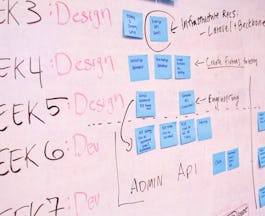Filter by
The language used throughout the course, in both instruction and assessments.
Results for "time-to-event+modeling"

Duke University
Skills you'll gain: Communication, Critical Thinking, Human Learning

Imperial College London
Skills you'll gain: Computer Programming

Ludwig-Maximilians-Universität München (LMU)
Skills you'll gain: Strategy, Strategy and Operations, Leadership and Management, Marketing, Business Development, Business Design, Entrepreneurship, Human Resources, Organizational Development, Sales, Market Analysis, Product Strategy, Decision Making, Finance, Game Theory, Human Resources Operations, Innovation, Research and Design, Design and Product, Mergers & Acquisitions, Planning

University of Maryland, College Park
 Status: Free
Status: Free
Coursera Project Network
Skills you'll gain: Microsoft Excel

Corporate Finance Institute
 Status: Free
Status: FreeUniversity of Zurich
Skills you'll gain: Probability & Statistics, Probability Distribution, General Statistics

University of Colorado Boulder
Skills you'll gain: Differential Equations, Linear Algebra
 Status: Free
Status: FreeCoursera Instructor Network
Skills you'll gain: Data Analysis

Vanderbilt University
Skills you'll gain: Project Management

University of Minnesota
Skills you'll gain: Human Computer Interaction, Research and Design, User Experience, User Experience Design, User Research
In summary, here are 10 of our most popular time-to-event+modeling courses
- Introduction to Logic and Critical Thinking: Duke University
- Introduction to Python for Researchers: Imperial College London
- Competitive Strategy and Organization Design: Ludwig-Maximilians-Universität München (LMU)
- Power Skills Essentials for Leading Project Teams: University of Maryland, College Park
- Introduction to Data Networks and the Internet - Bachelor's: Illinois Tech
- Create a Simple Project Timeline in Microsoft Excel: Coursera Project Network
- Introduction to ESG: Corporate Finance Institute
- An Intuitive Introduction to Probability: University of Zurich
- Foundations of Quantum Mechanics: University of Colorado Boulder
- How to Identify Your Target Audience: Coursera Instructor Network










